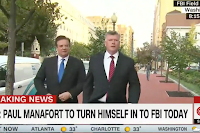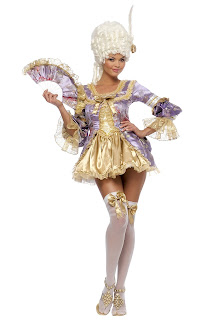It
was Manafort Monday and the day before Halloween. What better band to spend
it with than My Life With The Thrill Kill Kult?
All day, I had been going
around humming a little tune, checking twitter occasionally to see if anyone
else was being indicted, thinking lovely thoughts about come uppances and
revenge and retribution, just the kind of stuff that industrial electro-pop grindcore
audifies.* In the shops, people were dressed up a little bit, as zombies and
ghouls and as real people with blood on their faces, it was like being on the
set for a video for a song by the Cramps. Later, as I got ready to go out in my
thigh high boots (JUST KIDDING!) I played a bit of “Sex on Wheelz” as a warmup and
my daughter poked her head in my room.
Me:
“???”
Her:
“This sounds exactly like the music they play in Borderlands when a villain
pops up. “
Borderlands,
it seems, is a video game which purports to take place in another universe where everyone lives on a planet run
by crime lords (known as bosses), and every boss has it’s own theme music, much
like how baseball players get to choose a song to play while they’re walking up
to the batters box. The bosses pop up now and again, anticipated by cuts from
bands very much influenced by TTKK. In fact, video games in general seem to have been influenced by this
band: in 1998, there was even one called Thrill Kill that didn’t get released
because it was so violent. This struck me as an especially perfect metaphor on
Manafort Monday, since in a way he’s like a real life crime lord (though as a
matter of fact probably the music that plays when he walks in the room is by
Frank Sinatra…or that perp-y opening theme from “Dragnet.” So if you think
about it in the right light, who DOESN’T want to see TTKK on the night before
Halloween?
Sadly,
the literal answer to that rhetorical question is: everyone in the Silicon
Valley. It wasn’t TTKKs fault, really: it was sort of the fault of San Jose. That
place has been a bad location for live music for years and years, and I should
know, as I was the second string rock critic for the San Jose paper the Mercury
News for a while. Mostly I covered shed shows at nearby Shoreline or arena
shows, although I do recall a few weird outlying events like seeing Ted Nugent
at the Civic Center (where my brother, eyeing a guy who was dressed only
in a leopard print loin cloth and those Thor sandals that lace up around your calves,
made one of the all-time funniest
remarks of my working life when he asked wonderingly, “but where does he keep
his car keys?” or the Screaming Trees at some short-lived club or other right near
here where a guy called me and Isabelle “embarrassing women” to our faces,
because one of us had said something indicating we knew the name of the label, the
bass player, and opening act, and had
possibly even heard of Black Sabbath.
In
short, there is just something very un-rock ‘n’ roll about San Jose, and this
had never been truer than on last Monday night. As I drove through the deserted
streets – and I DO mean deserted -- I noticed a bunch of people in turquoise Sharks
jerseys walking away from the SAP Center. They were not walking towards the
Ritz, to top off their festivities with a little anti-religious/pro-satanic, psychedelic
electro punk, that’s for sure. After about the third couple walked by dressed
identically, it occurred to me that an ice hockey jersey, though exceedingly
unflattering to almost everyone, would be good Halloween costume, and how odd
it was that none of these people were intending it thusly.
What
makes a town a good rock town, anyway? My brother, who writes a whole blog on
this topic, says it has to do with cheap real estate, but if that were the
case, the San Jose would be far, far more of a hot spot. It’s really very
strange, there is a university just a few blocks away from downtown, lots of
good restaurants and bars, all kinds of things you’d want in a city…but from a
music perspective, the place just perennially languishes, and this was a case
in point: poor MTWTTKK were playing to a half full house – and ‘half’ is probably
throwing roses at it. It wasn’t quite a bad enough house to make me say they
were playing only to me; there was a hefty cheer after every song from “I See
Good Spirits and I See Bad Spirits” and “Confessions of a Knife,” but there was
a giant gaping empty space on the floor that could not have looked good from
the stage, and the band itself looked kind of shock-faced; like it was very
professionally going through the motions. It made me feel bad for them, and I
hate feeling bad for bands.
I
mean, you know the scene in “The Crow” where Brandon Lee gets all badass during
a Thrill Kill Kult performance in a warehouse, and people are all throwing
themselves off the stage and stuff? This show wasn’t at all like that. Also, the show only cost
$13 to get in – one dollar less than it cost to see “Blade Runner 2049” at the-good-cineplex-with-the-seats-you-lie-down-in
– but that also made me sad. I used to have a moderate liking for this kind of
industrial-disco-grindcore: seeing Ministry charm an Akron audience into quite
literally destroying the arena during a driving rainstorm is one of the signature
rock critic moments of my life, as was, in a slightly different way, the time
Al Jourgensen shook a devil-horned fist at me when I accidentally cut him off
on an on-ramp to MOPAC in Austin. TTKK’s shtick, with its anti-religious costumes and sex stuff, is way more campy than that, but they too were
groundbreaking in their way, and I like that song “Rivers of Blood, Years of
Darkness,” (although “do as you’re told with the weapons of the world” has a
more ominous sound to it than it did when I first heard it.)
As
the ‘Ks’ indicate, My Life With The Thrill Kill Kult aren’t as hardcore as
Ministry: their iconography is much more rooted in that latex-and-lace 70s L.A.
aesthetic, with a soupcon of horror film/serial killer chic laid on for good
measure; their music is essentially a loud fast
drone or chant overlaid with sampled snippets of b-movies over a very
industrial-strength rhythm. It's really a studio concoction, which is why its live act changes each tour: in this
incarnation, besides its two eternal main men (“Groovie Mann” and “Buzz McCoy”) and a
young drummer, there were two women with identical Bettie Page haircuts, one a cool-as-hell
bassist, Mimi Star, and the other ("Bomb Gang Girl") who stood stock still and did a zombie- robot dance the entire time. Later, someone asked me
if the show made my ears bleed, and the answer was, no – and that’s actually
problematic, because this kind of stuff doesn’t sound good unless it really makes
your bones shake. Plus, a band without a guitarist, while an admirable idea,
means that the key never changes, and monotony ensues. However grindy and electric the
machines and the keyboards get, you end up thinking, ‘this would be a lot more
tolerable to a person on speed.’ And there’s just no way that anyone is going
to be on speed on a Monday night in San Jose, although to their eternal credit,
there were two ladies clad in semi-obscene Marie Antoinette wear.
But
it’s hard to be alone in spirit like that, and they didn’t quite overcome my
ennui with the whole thing. Indeed, I left feeling disgusted that I had even
gone out; wishing instead that I had
stayed home to finish Laurent Binet’s book “The 7th Function ofLanguage,” which has one very interesting gloss on Deleuze and Guattari’s
concept of ‘desiring production,’ that is, the idea that desire is itself a productive,
if mechanistic, force, that drives people (all us ‘desiring machines’) to do things
in our social world that fall within the economy of desire; things
like going to nightclubs on Mondays to see loud bands who sing songs about
fucking and murder.
*(I
just made that word up, it’s the audible version of personifies.)











